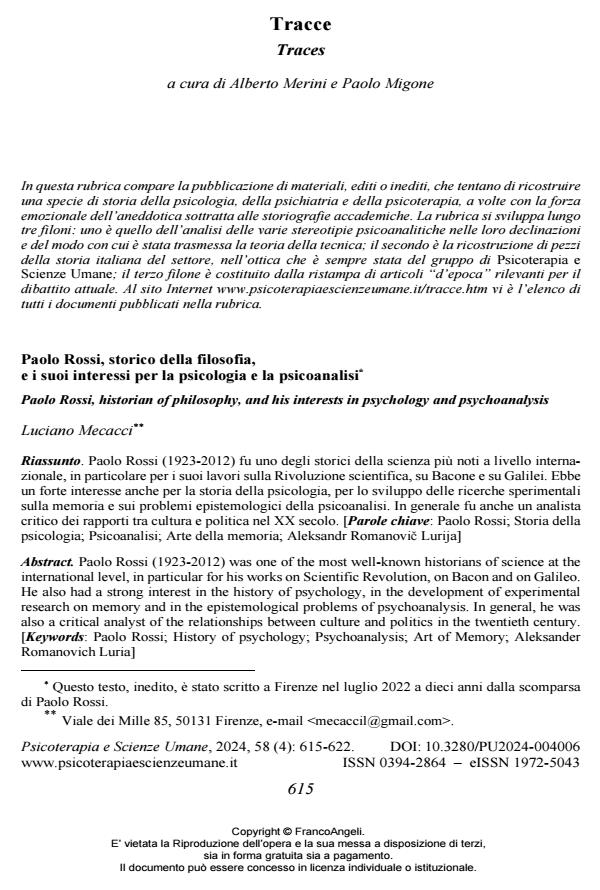Traces
Journal title PSICOTERAPIA E SCIENZE UMANE
Author/s Alberto Merini, Paolo Migone
Publishing Year 2024 Issue 2024/4
Language Italian Pages 8 P. 615-622 File size 87 KB
DOI 10.3280/PU2024-004006
DOI is like a bar code for intellectual property: to have more infomation
click here
Below, you can see the article first page
If you want to buy this article in PDF format, you can do it, following the instructions to buy download credits

FrancoAngeli is member of Publishers International Linking Association, Inc (PILA), a not-for-profit association which run the CrossRef service enabling links to and from online scholarly content.
A difficult dimension to accept is the self-founding one, for us humans who tend to constantly give ourselves over to the search for a first cause and end up finding it. Yet what distinguishes us and distinguishes our life is precisely knowledge understood as a permanent production of worlds through the very process of living. An epistemological orientation based on a body para-digm and that pays attention to relationship and experience can contribute to the understanding of the “hard problem” of consciousness and of the relationship between affective and cognitive neu-roscience, on one hand, and psychotherapy and psychoanalysis, on the other.
Keywords: Epi-stemology; Body; Relation; Experience; We-centric space
- Bachelard G. (1938). La formation de l’esprit scientifique. Paris: Vrin (trad. it.: La formazione dello spirito scientifico. Milano: Raffaello Cortina, 1995).
- Chalmers D.J. (1995). Facing up the problem of consciousness. Journal of Consciousness Studies, 2, 3: 200-219.
- Fissi S. (2024). Il confronto tra modelli nelle teorie della coscienza e nella psicoanalisi con particolare riguardo alla elaborazione predittiva. Psicoterapia e Scienze Umane, 58, 4: 567-588. DOI: 10.3280/PU2024-004003
- Frank A., Gleiser M. & Thompson E. (2024). The Blind Spot. Why Science Cannot Ignore Human Experience. Cambridge, MA: MIT Press (trad. it.: Il punto cieco. Perché la scienza non può ignorare l’esperienza umana. Torino: Einaudi, 2024).
- Gallese V. (2003). The manifold nature of interpersonal relations: The quest for a common mechanism. Proceedings of the Royal Society B: Biological Sciences, 358, 1431: 517-528.
- Gallese V. & Morelli U. (2024). Cosa significa essere umani? Corpo, cervello e relazione per vivere nel presente. Milano: Raffaello Cortina.
- Kuhn T. (1962). The Structure of Scientific Revolutions (2nd edition: 1970). Chicago, IL: University of Chicago Press (trad. it.: La struttura delle rivoluzioni scientifiche. Torino: Einaudi, 1969).
- Lévi-Strauss C. (1978). Myth and Meaning. Toronto: University of Toronto Press (trad. it.: Mito e significato. Milano: Il Saggiatore, 1980).
- Maturana H. & Varela F. (1984). El árbol del conocimiento. Las bases biológicas del entendimiento humano. Santiago: Editorial Universitaria (trad. it.: L’albero della conoscenza. Milano: Garzanti, 1987: Sesto San Giovanni [MI]: Mimesis, 2024).
- Mcculloch W.S. & Pitts W. (1943). A logical calculus of the ideas immanent in nervous activity. Bulletin of Mathematical Biophysics, 5: 115-133. DOI: 10.1007/BF02478259
- Meneguz G. (2024). L’energia libera della coscienza. Note a margine dell’articolo di Stefano Fissi “Il confronto tra modelli nelle teorie della coscienza e nella psicoanalisi con particolare riguardo alla elaborazione predittiva”. Psicoterapia e Scienze Umane, 58, 4: 589-606. DOI: 10.3280/PU2024-004004
- Papert S. (1965). Introduction. In: McCulloch W.S., Embodiments of Mind. Cambridge, MA: MIT Press, pp. xxi-xxviii (http://papert.org/articles/embodiments.html).
- Pichón-Rivière E. (1984). El proceso grupal. Buenos Aires: Nueva Visión (trad. it.: Il processo gruppale. Prefazione di A. Bauleo. Loreto [AN]: Lauretana, 1985; Milano: Pgreco, 2021).
- Solms M. (2021). The Hidden Spring: A Journey to the Source of Consciousness. New York: Norton (trad. it.: La fonte nascosta. A cura di Andrea Clarici. Milano: Adelphi, 2023).
- Stent G. (1972). Prematurity and uniqueness in scientific discovery. Scientific American, 227, 6: 84-93.
- Varela F. (1979). Principles of Biological Autonomy. Oxford, UK: North Holland.
- von Foerster H. (1981). Observing Systems. Seaside, CA: Intersystems Publications (trad. it.: Sistemi che osservano. Roma: Astrolabio, 1987).
Alberto Merini, Paolo Migone, Paolo Rossi, storico della filosofia, e i suoi interessi per la psicologia e la psicoanalisi in "PSICOTERAPIA E SCIENZE UMANE" 4/2024, pp 615-622, DOI: 10.3280/PU2024-004006